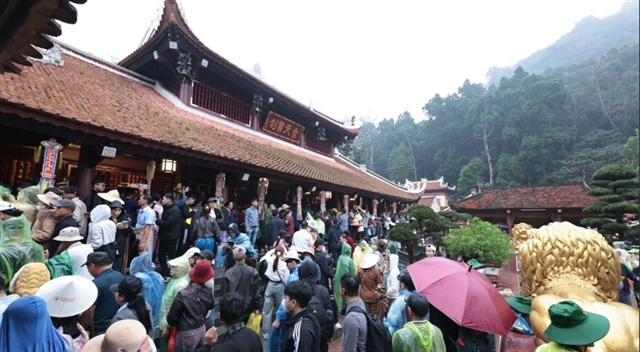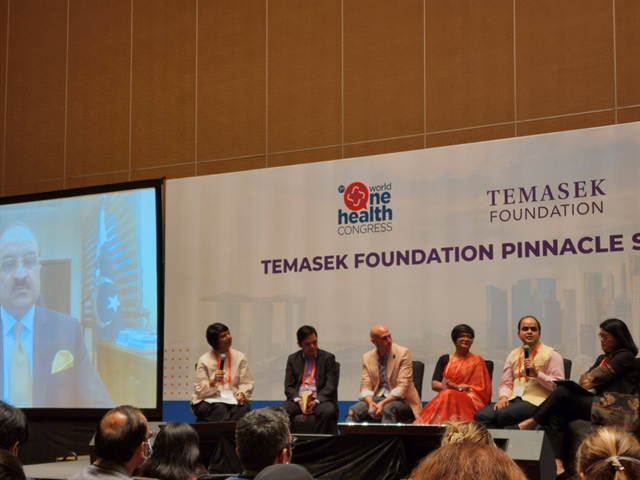 Society
Society

 |
| Panel discussion on country priorities for genomic surveillance in Asia as part of the Pinnacle Series by Temasek Foundation held alongside the World One Health Congress in Singapore this week. — VNS Photo Trọng Kiên |
SINGAPORE — COVID-19 has further highlighted the need for more robust collaboration between countries in Asia, especially Southeast Asia, in genomic sequencing and surveillance for upcoming threats, experts said in a seminar held alongside the World One Health Congress in Singapore this week.
Prof Paul Pronyk, Duke-NUS Centre for Outbreak Preparedness, Duke-NUS Medical School, Singapore, in the keynote presentation of the Pinnacle Series' session on Asia pandemic surveillance, said the connections and data sharing would be key in monitoring potential pathogens, not only in dealing with variants of COVID-19, but also with future epidemics in a more confident manner.
The Asia Pathogen Genomics Initiative (Asia PGI), which started out in early 2022, was meant to amplify cross-country collaboration in genomic surveillance across the continent, similarly to the African counterpart (Africa PGI) that was established before the COVID-19 pandemic broke out and has demonstrated effectiveness in dealing with contagions.
So far, in the 13 country partners in the Asia PGI initiative, seven have completed the landscape assessment framework for pathogen surveillance and genomic sequencing – Bangladesh, Brunei, Indonesia, Nepal, Pakistan, Sri Lanka, and Thailand – while five others are still conducting their assessments – Cambodia, India, Laos, Malaysia, and Việt Nam, while the Philippines is slated to finish theirs in 2023.
There is some level of data sharing – 13 countries have shared more than 77,000 viral genome sequences from human cases of COVID-19 via GISAID, a global science initiative that provides open access to genomic data of viruses like coronavirus and influenza. https://gisaid.org/
The Singapore-based professor also noted that while all countries have prioritised tuberculosis and coronaviruses and along with antimicrobial resistant bacteria and influenza, and SARS-CoV-2 (responsible for COVID-19 pandemic) and influenza are sequenced for routine human surveillance in most countries, other priority pathogens – including arboviruses (viruses transmitted by anthropod vectors like mosquitoes), measle and rubella, polio, HIV, etc. – are not sequenced for human, animal, and environmental surveillance.
But the wide discrepancy between different countries up to 60 fold (0.3 to 20 samples sequenced for every 100,000 people), and the fact that Singapore has sequenced up to 166.31 samples per 100,000 population indicates that there is still much room for improvements in this critical aspect, Professor Paul remarked.
He said that capacity for genomic sequencing and pathogen surveillance exists across all countries, but laboratory and bioinformatic capacity will need to be enhanced, with financial sustainability and national planning critical for the efforts.
Partnerships with industry/private sectors are also required to improve supply chains of required equipments and materials needed in sequencing and surveillance, the expert noted.Senjuti Saha, Director of the Child Health Research Fund in Bangladesh, attributed the lesser collaboration among Asian nations to the “very different geopolitical backgrounds and complicated relationships” along with population sizes and levels of economic development.
However, she also remarked that there is more collaboration within countries, for example during COVID-19, there are many colleagues across Asia who “reached out to each other and we have written papers together, because through working together, we will be stronger.”
"Asia urgently needs to build capabilities to be ready to respond to any outbreaks that can potentially pose a major threat to the lives and livelihoods of its populations," said Mr Lim Hock Chuan, Head, Programmes, Temasek Foundation, which is organising the Pinnacle Series run alongside the main Congrss from November 8-10, focusing on readiness to combat public health threats in Asia, particularly Southeast Asia, which run alongside the main Congress from 8 to 10 November. — VNS




